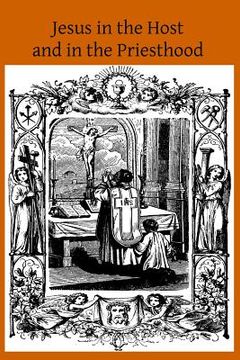Jesus in the Host and in the Priesthood: Chapters Excerpted from the Life of the Reverend Mother St. Teresa of Jesus, Abbess of the Convent of the Poo
Synopsis "Jesus in the Host and in the Priesthood: Chapters Excerpted from the Life of the Reverend Mother St. Teresa of Jesus, Abbess of the Convent of the Poo"
THE Contemplations on the Priesthood, here offered for the meditation of priests, are extracts from the life of a holy and humble Abbess of Poor Clares, who died March 26, 1884, in the odour of sanctity, at Lavaur. The Reverend Mother, St. Teresa, who was born January 2, 1828, wrote, by order of her directors, her wonderful life. She had, especially during her last years, most exalted Contemplations on the Priesthood. From these, necessarily abridged in the history of her life, it has been thought useful to draw up this selection. Herny Edward Cardnial Manning says this in the preface: It has been well said that one of the internal evidences of the truth of the New Testament - especially of the Apostolic Epistles-is to be found in its "unanxious language" Everyone who has had to deal with the controversies of Arians, Unitarians, Sacramentarians, and Calvinists will know how even the inspired writings can be interpreted in erroneous senses, and how true is the axiom of St. Augustine, that no language is sufficiently perfect to express adequately the conception of the mind. There is, however, no doubt that the verbal over-statement of certain passages in these pages is amply balanced by accurate statements in other parts. The equilibrium is thereby restored. But overstatement is always a danger. In the inspired writings there is a calmness and a self-restraint, a measure and proportion which results from "the analogy of faith". Nevertheless, there are passages of a divine intensity, which some men count to be over-statement, and others explain away. For example- "That Christ may dwell by faith in your heart; that being rooted and founded in charity, you may be able to comprehend with all the saints what is the breadth and length, and height and depth; to know also the charity of Christ, which surpasseth all knowledge, that you may be filled unto all the fulness of God" (Ephesians iii. 17- 19). Here are three expressions which peremptorily refuse the glib hermeneutic "that they only mean this". The indwelling of Christ is not hypostatic, but everything short of it. The knowing that which surpasseth all knowledge is. nothing less than the totum non totaliter; and the being filled unto all the fulness of God can only be understood when we shall know even as we are known. "The charity of Christ presseth us (urget nos), judging this, that if one died for all, then all were dead; and Christ died for all, that they who live may not now live to themselves, but unto Him who died for them and rose again" (2 Cor. v. 14, 15). This is not less than to be alter Christus. "Know ye not that your members are the temple of the Holy Ghost who is in you" (I Cor. vi. 19). Here is inhabitatio in every sense, except hypostatical. Again, "he who is joined to the Lord is one spirit" (ibid. 17). The interpreters whom Aristotle calls "straw-splitters" would surely affirm that this is a hypostatic unity in which the human personality ceases to exist.

